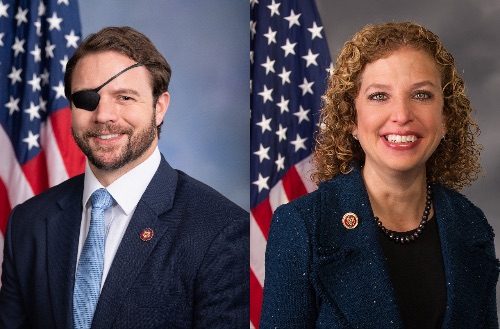Your Daily Phil: Hadassah takes up the issue of infertility + What really happened at Mount Sinai?
Good Thursday morning!
The International Council of Jewish Parliamentarians met yesterday for the first time in five years during the World Jewish Congress’ (WJC) Plenary Assembly, which meets to discuss local and global concerns.
Sen. Jacky Rosen (D-NV) chairs the group, whose other members include Anthony Housefather, a member of parliament in the Canadian House of Commons; Merav Ben Ari, an Israeli Knesset member; and Waldo Wolff of Argentina’s Chamber of Deputies. The group discussed global antisemitism and violent extremism. WJC President Ronald Lauder spoke about the ongoing Hamas rocket attacks on Israel and the dangers of conspiracy theories and xenophobia.
Human services charities will likely experience revenue declines in 2021 as charitable giving returns to its normal, post-pandemic patterns, according to a new report from GivingTuesday’s research arm.
Based on data from 74 charitable-giving platforms, the report estimated that overall giving increased 5.2% in 2020 from 2019, but as the pandemic recedes, civil rights issues and charities unconnected to the pandemic will recapture their usual share of donor dollars.
About 300 people have registered for the first Jews of Color Shabbaton, a virtual event to be held May 14-16 by the Jews of Color Mishpacha Project and supported by the Jews of Color Initiative, Charles and Lynn Schusterman Family Philanthropies and the UJA-Federation of New York.
The event was inspired by Jews of Color Initiative Executive Director Ilana Kaufman’s visit to Baltimore last year. Kaufman spoke at an event that drew more than two dozen Jews of Color, Harriette Wimms, the organizer of the Shabbaton, told eJewishPhilanthropy.
“I didn’t even know that these people existed, and we’re all family,” Wimms said. “That moment has literally changed my life.”
FIRM RESOLUTION
Hadassah has a new advocacy issue — infertility


U.S. House of Representatives
A third of Americans have needed fertility treatment or know someone who has. Yet when Karen Paikin Barall, the chief lobbyist for Hadassah: The Women’s Zionist Organization of America, started discussing infertility with lawmakers and staffers on Capitol Hill, the most common reaction was a question: “Why don’t they just adopt?” Paikin Barall found that response to be both insensitive and enlightening. “When we hear people asking about adoption, we know we need to do more education,” Paikin Barall told eJewishPhilanthropy. “We know we need to present stories, and talk about different kinds of families.”
Hearts and minds: Education had to come before lobbying. Before working on legislation, lawmakers would have to understand the issue in a different way — as a medical problem that requires costly treatment, but is almost never covered by insurance. On April 20, that strategy produced a congressional resolution co-sponsored by Reps. Dan Crenshaw (R-TX) and Debbie Wasserman Schultz (D-FL) that recognizes infertility as something that affects diverse groups, although some groups have less access to treatment, because it is so expensive. The resolution isn’t legislation that would actually create policy, it’s a way for Hadassah to try to redefine infertility and begin to suggest ways to make treatment more accessible.
A range of supporters: “We have relationships with both sides of the aisle because of our pro-Israel agenda and our work on antisemitism,” Paikin Barall said of Hadassah’s lobbying efforts in Washington. Hadassah first took up the cause of infertility because it was a topic of concern to its membership and a good fit with the organization’s historical mission of supporting the Hadassah Medical Organization, which runs two hospitals in Jerusalem and established an expertise in the field of fertility in the 1960s. One in six Jewish couples face infertility, which is a higher percentage than the one-in-eight rate among the general population.
PEW TWO
Reflections on the 2020 Pew study


iStock
In an analysis for eJewishPhilanthropy, Dr. Steven Wimndmueller looks at a sampling of the many content areas, data-sets, and analysis contained in Pew’s just-released “Jewish Americans in 2020.”
Data overview: “Among its distinguishing features are the series of interviews with rabbis as a way of giving definition and meaning to some of the trend lines being reported. A brief analysis of the rise and presence of Jewish start-ups … has been included. Specific attention is given to the economic characteristics of American Jews, representing one of the first contemporary studies to focus on this field of research, as well as a section of the report devoted to Chabad and its unique role.”
The COVID factor: “In a related Pew study, conducted last August in connection with the pandemic, Jews were more severely impacted by the virus than other faith-based groups, possibly because of the high density of Jews residing in the metropolitan New York area. Over half of Jews (57%) reported knowing someone who had contracted the virus or who had died from it.”
A COVENANT AT SINAI
What really happened at Mount Sinai? (Shavuot 5781)


JFN
“According to Midrash, all the souls of the future generations were present at Mount Sinai the moment the Torah was given. As a child, I believed this to be literally true, which posed some challenges to my young mind,” writes Andrés Spokoiny in an opinion piece for eJewishPhilanthropy.
Shavuot: “Little did I know that the question of ‘what really happened at Sinai’ had occupied theologians, rabbis, and sages for millennia. In fact, Jews revisit that question every year on Shavuot, the holiday that commemorates that momentous event.”
Covenant: “On a basic level, we received the 10 commandments at Sinai, but on a deeper level, much more happened. Sinai was, above all, a covenant. It was a pact between God and the People, but – maybe more consequently – a pact among the Israelites.”
Worthy Reads
Doing Both: In Inside Philanthropy, Martha Ramirez profiles the Four Freedoms Fund, an immigration rights organization that offers a case study in the need for a philanthropic paradigm that recognizes the need for efforts on both the federal and the local levels. Supported by five national foundations, the fund’s creation represented a shift away from immigration activism’s focus on policy and toward the communities affected by them amid a wave of anti-immigrant sentiment after 9/11. “You can’t just fund a bunch of policy advocacy groups in D.C. and get the change that we want on a federal level,” said Four Freedoms Fund’s Director Anita Khashu. “You need to have groups working communities and… at the state level and the local level that are doing the work to build momentum toward that reform.” [InsidePhilanthropy]
Positive Energy: On an episode of the “Energy for Growth” podcast, Rachel Pritzker, founder of the Pritzker Innovation Fund, speaks with Rose Mutsio and Katie Auth about her signature line: “Poverty is not my favorite solution to climate change.” As an energy philanthropist, Pritzker has made it her mission to argue against the common assumption that developing countries need to sacrifice economic progress to address climate change. The answer, she says, is better energy technology, not less of it. “Poor people want out of poverty, and I think rich countries have a responsibility to take on the burden of decarbonizing our own countries, and doing that will demonstrate the portfolio of technologies that will allow us to do that.” [EnergyGrowth]
Real Good: In the last decade, artificial intelligence (AI) has proved itself a powerful tool for social good, but it comes with high up-front costs, from expensive technology to staff training, write Ben Brockman, Skye Hersh, Brigitte Hoyer Gosselink, Florian Maganza and Micah Berman in a blog post on Stanford Social Innovation Review’s website. Philanthropists should therefore only attempt to harness the potential of AI in certain issue areas, especially medical diagnostic tools, communication support for marginalized communities and agricultural yield prediction, according to the authors’ research. “By staying the course and seeing promising technological innovations through to scale, investors can unlock inordinate social value.” [SSIR]
Simple Prose: Repetition, pithiness and a personal tone are the essential strategies to deploy when writing direct mail letters, suggests Rachel Hagerman in Philanthropy Daily. Would-be writers of such solicitations must ignore their hopes of winning donors hearts’ with clever language, and opt for short words and a punchy tone that will enable a reader to easily skim the letter before tossing it away. “Don’t be beholden to grammar conventions—this is direct mail, not your dissertation.” [PhilanthropyDaily]
Community Comms
Apply! Want to join the team at Jewish Insider/eJewish Philanthropy? We’re looking for a top-notch philanthropy editor. Learn more here.
Be featured: Email us to inform the eJP readership of your upcoming event, job opening, or other communication.
Word on the Street
Dr. Bruce Powell and Dr. Ron Wolfson have published a new book, Raising A Human Beings… French-Israeli author Shmuel T. Meyer won France’s top literary prize… The Social Innovation Summit announced a speaker lineup of celebrity changemakers, philanthropists and corporate executives for its June convening… a Sephardi Kashrut Authority-licensed vegan restaurant has opened in London’s East End… The Met Council has distributed 1,550 boxes of halal food at New York City mosques… The Knesset vote for Israel’s next president will be held on June 2…
Pic of the Day


World ORT
Students connected online and in their classrooms to mark the annual celebration of ORT’s global education network driven by Jewish values.
Birthdays


PUNKTOAD VIA WIKIMEDIA COMMONS
Actress, writer, producer and director, Lena Dunham…
South African lawyer and banker, Sir Sydney Lipworth QC… Actress Zohra Lampert… Actor and producer, Harvey Keitel… Ophthalmologist in South Florida, Dr. Joel Sandberg… Chief scientific officer for COVID-19 Response at the Health and Human Services Department, David A. Kessler… Founder and former CEO of LRN, a legal research, ethics and compliance management firm, Dov Seidman… Retired NFL defensive lineman, Josh Heinrich Taves, a/k/a Josh Heinrich… Ice hockey player, she won a gold medal at the 1998 Winter Olympics and a silver medal at the 2002 Winter Olympics, Sara Ann DeCosta… U.S. Senator Tom Cotton (R-AR)… Chief community and Jewish life officer at The Jewish Federations of North America, Sarah Eisenman… UK Labour Party MP (2010-2019), in February 2019 she left the Labour Party in protest of Jeremy Corbyn’s leadership, and is now managing director at Edelman UK, Luciana Berger… Co-founder of Asana, Justin Rosenstein… Retired NFL offensive lineman, Brian de la Puente... Co-founder of Manna Tree Partners, a private equity firm focused on healthy food, Gabrielle “Ellie” Rubenstein… Analyst in business operations at Tel Aviv-based Zoomin Software, Galit Krifcher… Fellow at the Public Interest Fellowship, Dore Lev Feith… Director of external affairs at the Manhattan Institute, Jesse Martin Arm… Program manager at Jigsaw, Raquel Saxe… Former Israel Director for J Street, Yael Patir…
Email Editor@eJewishPhilanthropy.com to have your birthday included.








